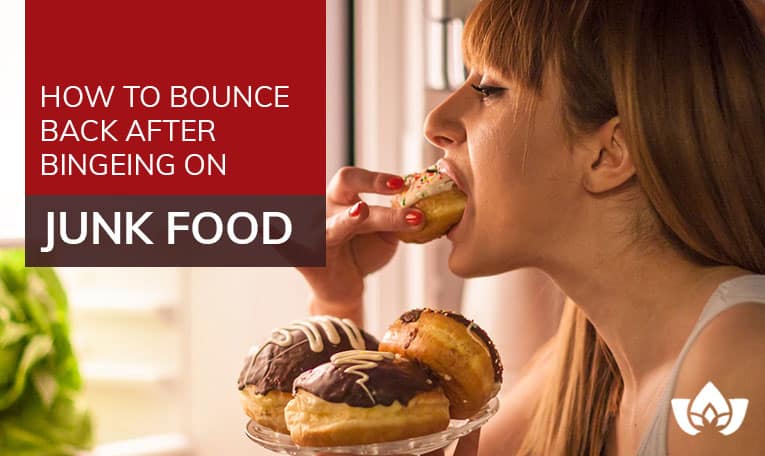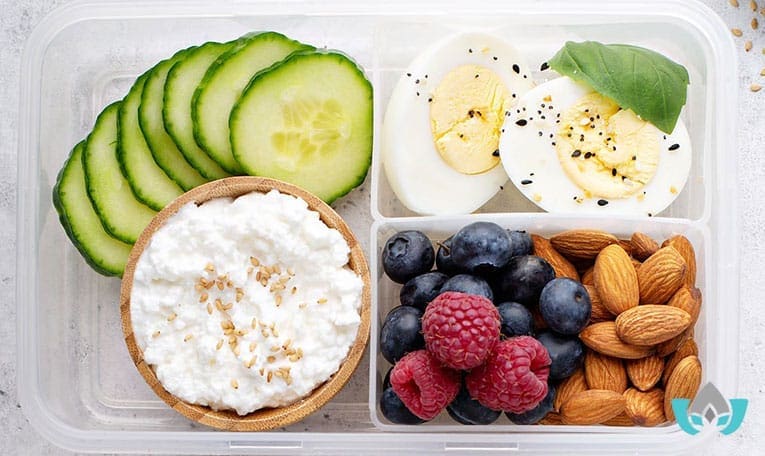
We’ve all done it.
After weeks spent following a healthier lifestyle, you get a craving for a food you don’t get to eat very often.
Just a little bit won’t hurt.
But before you know it, you’ve binged on an entire family-size bag of chips and a whole sleeve of cookies.
It’s not a great feeling, but you can come back from it.
With support from a local naturopathic doctor, you can learn how to bounce back after bingeing on junk food, and how to better manage your diet to safeguard yourself against future binges.
The obvious best choice is to avoid junk food, but nobody’s perfect.
Let’s take a look at what happens after a junk food binge, and what you can do to help yourself bounce back from it.
What Happens When You Binge On Junk Food?
A “binge” is defined as an episode where you eat a large amount of food in a short period of time, often to the point where you feel uncomfortably full.
A binge also usually involves food that’s high in fat, carbs, or sugar—we don’t typically talk about binge-eating fruit and vegetables.
When you binge on junk food, your blood sugar rises, which can lead to arterial inflammation and chronic disease.
It’s also hard to break the cycle of bingeing, because typical binge foods tend to be addictive.
In fact, one 2007 study found that the chemical reward your brain gives you for intensely sweet food is stronger than the chemical reward you get from a hit of cocaine.
But all hope is not lost.
There are ways to come back from a binge.
Keep reading to learn how you can recover after eating too much.
How To Recover From A Junk Food Binge And Get Back On Track
Even though you may feel consumed by guilt and shame, there are ways to come back from a binge.
One bad moment doesn’t mean you’ve ruined your life or your health forever.
Check out this list of things you can do after a binge to get back on track.
1. First, Be Kind To Yourself
Don’t beat yourself up.
Junk food is named that for a reason, and you probably already know all the reasons why you should avoid it.
But willpower can only last so long.
2020 has been a hell of a year, and sometimes when you’re dealing with a particularly difficult period in your life, food can be an important source of comfort.
You probably feel bad enough physically, and being hard on yourself emotionally isn’t going to help.
Take a moment to acknowledge your feelings of discomfort and then do something nice for yourself that doesn’t involve food.
Remind yourself that tomorrow is another day and you can start fresh.
2. Go To Bed, And Get A Good Night’s Sleep
After a binge, make sure you get a full 7-9 hours of sleep.
Getting enough sleep means that you’re less likely to eat high-carb and high-fat food the following day.
A 2013 study found that people who got fewer hours of sleep were more likely to overeat the following day, and consume more calories from carbs and fat.
People who slept for longer ate less overall, and ate less fatty and carb-heavy food.
If you’re the type who has trouble sleeping (many of us have been there), consider a yoga practice before bed.
3. Tomorrow Morning, Eat A Breakfast Rich In Fibre And Protein. Don’t Starve Yourself
The day after a binge, you might be tempted to restrict food intake.
This is actually much more harmful than eating a proper breakfast, because you risk triggering your body’s starvation mode, which happens when your body realizes you’re not getting the nutrients you need and it retains the energy that it already has.
After a binge, you’ll likely still wake up hungry and you should still be eating a nutritious meal.
The best kind of food for this is a mix of proteins, carbs, and fat: eggs, avocados, and fruit, for example.
These are foods that stimulate digestion and will help your body process the meal from the previous day.

4. Drink Lots Of Water
Even though you may feel super full, you should still stay hydrated.
Drinking water can help support your digestive system and make you feel less bloated.
Drinking water also helps your metabolism stay healthy.
Consider keeping a glass of water handy, and filling it up whenever you notice that it’s empty.
5. Get Some Exercise, Even If It’s Light
Exercise can make you feel better the day after a binge because it releases endorphins to the brain.
It also will help you feel less sluggish.
Just be careful not to overexert yourself.
Exercise shouldn’t be a direct counter after bingeing; you should do it because it feels good, not because you want to compensate for eating too much.
6. For Lunch And Dinner, Eat Clean
You don’t need to do a full detoxification routine after a binge, but your meals the day after should help reset your eating habits.
Ideally, your next couple of meals would have a healthy balance of protein, fiber, and fat.
Baked or grilled proteins, leafy greens, and complex carbs like quinoa and sweet potatoes are great ideas for post-binge recovery meals.
7. Work On The Root Of The Problem
There are plenty of good ideas to help you get back on track after a binge, but you might end up doing it all over again if you don’t address the root problem.
It may be that your diet is too restrictive, which makes you prone to overeating at inconvenient times.
Or you might have emotional reasons for seeking comfort food.
Whatever the problem is, working with a naturopathic doctor to discover and understand it is a great step towards cultivating sustainable and healthy eating habits.
Book An Appointment At The Mindful Healing Clinic
Are you fed up of the vicious cycle of bingeing and then trying to get back on track?
Or do you want to learn more about the reasons that cause you to want to binge, and how to solve them?
If you’re ready to start the journey towards healthier living, book an appointment with Dr. Maria at the Mindful Healing Clinic.
During your first appointment, you’ll be able to discuss your health concerns with us and we’ll come up with a plan that works for you.
Your goals are our goals: helping you to achieve a healthier lifestyle with natural solutions.
Book an appointment with us today.
Until next time,
Dr. Maria Cavallazzi, N.D
Mindful Healing Naturopathic Clinic
Mississauga, ON L5M 1L7
(905) 819-8200
► https://g.page/MindfulClinicNaturopathic
Dr. Maria Cavallazzi is a medical doctor from Colombia where she practiced as a family physician for 8 years until she moved to Canada 16 years ago and became a naturopathic doctor in Mississauga.


